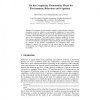Free Online Productivity Tools
i2Speak
i2Symbol
i2OCR
iTex2Img
iWeb2Print
iWeb2Shot
i2Type
iPdf2Split
iPdf2Merge
i2Bopomofo
i2Arabic
i2Style
i2Image
i2PDF
iLatex2Rtf
Sci2ools
100
click to vote
DALT
2007
Springer
2007
Springer
On the Complexity Monotonicity Thesis for Environment, Behaviour and Cognition
Development of more complex cognitive systems during evolution is sometimes viewed in relation to environmental complexity. In more detail, growth of complexity during evolution can be considered for the dynamics of externally observable behaviour of agents, for their internal cognitive systems, and for the environment. This paper explores temporal complexity for these three aspects, and their mutual dependencies. A number of example scenarios have been formalised in a declarative temporal language, and the complexity of the structure of the different formalisations was measured. Thus, some empirical evidence was provided for the thesis that for more complex environments, more complex behaviour and more complex mental capabilities are needed.
Related Content
| Added | 07 Jun 2010 |
| Updated | 07 Jun 2010 |
| Type | Conference |
| Year | 2007 |
| Where | DALT |
| Authors | Tibor Bosse, Alexei Sharpanskykh, Jan Treur |
Comments (0)

